#Going My Way review
Explore tagged Tumblr posts
Text
crowd vs. critic single take // GOING MY WAY (1944)

Photo credits: IMDb.com
The Church of St. Dominic is dying. Enter: Father O’Malley (Bing Crosby), who has been sent by Catholic Church leadership to revive an unenthusiastic congregation meeting in a building they can’t pay for. Father Fitzgibbon (Barry Fitzgerald) has been leading St. Dominic's for 45 years, and change doesn’t come easily. As they fight to relieve the church’s mortgage and support the struggling members of their parish, though, Father Fitzgibbon begins to see maybe he does need help after all, and maybe he needs it from someone less orthodox like Father O’Malley.
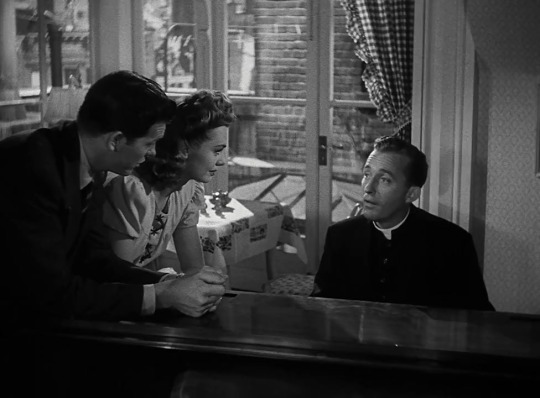
CROWD // Going My Way straivags its way through an episodic story. Fitzgibbon fights a cold and negotiates with creditors. O’Malley supports a runaway teen who dreams of being a singer, bumps into an old flame, and plays baseball with the boys in the neighborhood (with a shout-out to my shuttered hometown team the St. Louis Browns!) The duo plays checkers and golf, and we watch a full song performed from the opera Carmen. The adagio pace is a feature, not a bug, though perhaps it’s why, in a rare move, I needed to watch this Best Picture winner a second time because I couldn’t remember what happened not long after my first watch.
That said, the tone is also why this is a rare feel-good Best Picture winner. If Bing Crosby is in your movie, almost by default one of your themes becomes the power of music. Music gives hope to all of the parishioners of St. Dominic’s, and it literally solves life’s big problems for several of them. While the plot may not move with the efficiency and humor of White Christmas, it’s hard to complain about any story that gives Crosby the chance to sing.
POPCORN POTENTIAL: 7.5/10
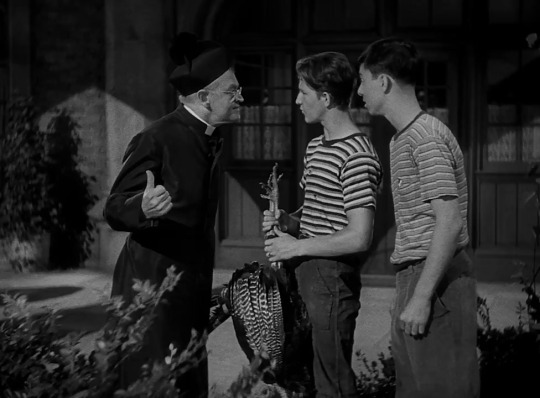
CRITIC // The Best Picture winner this film reminded me of most? 2022’s CODA, another feel-good narrative about the power of music. The biggest reason I kept comparing them in my mind, though, is the eras they were released. CODA was a heartwarming story released as we were exiting a pandemic, and Going My Way won Hollywood’s highest honor just two months before V-E Day. Sometimes when the world around you feels almost too much to bear, you need an escape. The same could be said for last year’s winner Everything Everywhere All at Once or this year’s Best Picture nominee The Holdovers. (We’ll see how world events play out in 2024 and if this trend continues, but it’s unlikely we’ll see another feel-good nom about Catholic priests given the baggage we have now, as outlined in 2015’s winner Spotlight.)
It may have less of a legacy today than competitors Double Indemnity and Gaslight, but at the time, Going My Way was a big winner. In addition to the top prize, it brought home trophies for Best Actor (Crosby, which Christian Blauvelt’s book Hollywood Victory noted was new range for this superstar), Supporting Actor (Fitzgerald, the only person to be nominated in both lead and supporting categories before rules prevented it from happening again—talk about category fraud!), Director, Original Story, Screenplay, and Original Song. Today’s audiences may not find it innovative, but it hits all its marks, and its arcs are universal, such as an older generation dealing with its obsolescence or the rich holding those meant to help a community hostage with their finances. (The Bishop’s Wife and It’s a Wonderful Life would go on to explore this idea with more depth.) Though there is a surprising lack of spiritual experience with God given the setting, it is also refreshing in our moment to watch the clergy devote their lives to bettering their neighborhood.
ARTISTIC TASTE: 8.5/10
#Crowd#Critic#Going My Way#Academy Awards#Oscars#Best Picture#Best Picture Project#Bing Crosby#Barry Fitzgerald#The Bishop's Wife#It's a Wonderful Life#Gaslight#Double Indemnity#Spotlight#Everything Everywhere All at Once#CODA#Going My Way review#The Holdovers#White Christmas#7.5/10#8.5/10#Single Take#1944
1 note
·
View note
Text
One thing I wish I'd see more of among Ratio fans is some thought about how he views himself as a teacher.
Like yes, of course he refuses to compromise on the quality and rigor of the education he imparts, and he would find it unforgivably unethical to lower his standards in order to pass more students who had not genuinely learned the material. This is core to his character.
However, as someone who is a teacher IRL, I know the absolutely miserable feeling setting that kind of standard can cause. There's the obvious disheartening sense of disappointment ("Are students these days really not capable of doing the work correctly? Is our future in danger, if this is the highest level of understanding our current generation of students can achieve?"), but even worse than that is the self-doubt.
"Is this somehow my fault? Am I not teaching this material in the right ways for the students to learn? Is there something I could have done differently to get through to these students? Would a better teacher have a higher passing rate?"
We know that Ratio does (or at least did) struggle with feeling inferior to the Genius Society, so I think it is also likely, as much as he absolutely will not budge on his academic standards, that he has doubts about his teaching ability as well.
This is the man who wants to educate the entire world to cure the disease of ignorance, and yet only 3% of his actual students are able to get there. How can someone who gets so few of his direct students to a state of enlightenment hope to enlighten the whole universe? If so few students are successfully learning the material of a given class, doesn't that mean the teacher is doing something wrong?Would a better teacher--would a genius, maybe--not be able to impart their knowledge more efficiently and educate even the most challenging of students?
As someone constantly struggling with that balance between keeping academic standards high while also meeting the needs of today's students, I think the passing rates of his courses must affect Dr. Ratio much more deeply than I've seen fans discuss. I think he would question himself harshly over his class success rates, and I think he must be constantly trying to push himself to become the best teacher he possibly can be.
tl;dr: I hope one day the HSR fandom will stop sleeping on the fact that Ratio is an actual practicing professor who probably has astronomical levels of teacher angst. 😂
#honkai star rail#dr. ratio#not to be#ratiorine#in everything I post but#secretly this is just an excuse to imagine Aventurine throwing Ratio a sympathy party#a “Let's eat our feelings" party because the doctor just got his course evals back#and there are some insults on there that would make his ancestors cry#I can just imagine Aventurine reading out the really obnoxious Rate My Professor reviews#in whiny entitled voices#just to squeak a smile out of a gloomy Ratio#but I also really like the idea of Aventurine helping Ratio become a better teacher!!#because he's sharp and a fast learner#but he doesn't have a background in formal/public education#he's not set in the system's ways#he could suggest some really out-of-the-box ideas to help Ratio get through to more students#and be a great sounding board for Ratio's lesson material#brutally honest feedback lol#“Ratio I am in love with you but I still can't listen to you talk about gravitational time dilation for one minute more”#“You're going to HAVE to make this lecture less dry than my martini.”#look let me just enjoy this teacher fantasy for a sec#lol
402 notes
·
View notes
Text



𖤓°⋆.ೃ࿔*:・
#luke hemmings#*#lrhedit#5sosedit#5sos#luke#doing calum's set made me go back to review otr <3#can i be parasocial in my tumblr tags on a saturday night#i don't always love posting yb luke gifs even though i make them quite often and enjoy doing so#because the tags get filled with people saying yb supremacy!!! and the best he's ever looked!! and youngblood luke best luke!! etc.#and i know its not that serious#but it makes me sad because he's grown so much since then in every way as a person a musician everything#and he's soooo much happier than he ever was at this time#i feel its so reductive to have this perspective without considering what you really mean by it#and i don't love reading it#this can be applied to the whole band also#i have strong feelings about the youngblood effect so to speak and how it follows them no matter what they do#also if it looks janky by his shoulder its because i had to manually remove the godforsaken apple music watermark ok thanks
153 notes
·
View notes
Text

We did it yall!!! We beat seasonal depression and artblock~!!!! 😭😭😭😭
#WIP#Good lird#i have a long way to go#but im feeling better i'd like to thank the copious amounts of reality tv recap/review youtubers for boosting my moral#idk how they did it but they were a pleasant distraction#anyways back to stardew dress up shenanigans
56 notes
·
View notes
Text



I've been thinking about carmarcus lately
#the bear#the bear fx#carmy berzatto#marcus brooks#the bear marcus#also i drew these on my ipad on the bus which is why theyre bad#carmarcus#carmymarcus#carmy x marcus#idk what their shipname is whatever#now hear me out. their relationship is absolutely doomed and not going to end well. but it'll be amazing#i like seeing s1 marcus as kind of starstruck and crushing on carmy#the way he looks up to carmy's experience is so important to me#and also imagine how heartbroken marcus is in Review when carmy blows up at him and he's very cruelly forced to face this really ugly side#of his cool boss that seemed so forgiving and peaceful only days ago#i also like carmy being the more experienced/confident one in this ship#hes not necessarily like super confident or forward but i see it more like him being guiding#encouraging even#kind of like in Sheridan when the power goes out and he gives marcus that pep talk#ok well i have a lot of thoughts but if you want to read them then join my thebear discord server
47 notes
·
View notes
Text
youtube
ryan being thirsty about shane for nearly 7 minutes: a shyan crack edit
#shyan#shane x ryan#skeptic believer#otp: we took an oath#work husbands#shyanedit#I think I'm actually proud of this#if you like it please comment here or yt so I'll know to make more#sorry this didn't go up sooner but I kept thinking of things to add#it went a little off the rails but I think in a good way#may it bring you some joy!#thank you to my beautiful moots who peer reviewed this and gave me the confidence to post it#myedits#myposts
46 notes
·
View notes
Text

#IMNGONNA LOOSE MYBJFJDJSDHHS MIND#ah hem sorry lemme#i know it’s not everyone’s cup of tea but today i am thinking WAY TOO FUCKING HARD on#inexperienced sugar baby Raven x inexperienced sugar daddy Price#HEAR ME THE FUCK OUT DONT LEAVE YET PLEASE pft NDJSJDHSHJS#idea is that Price gets a lil lonely and one of the lads (kyle)dragged him onto this whole sugar daddy business#price didn’t know how shit works - went out with 1 sugar baby with an obnoxious experience and said never agaib#but saw Gaz with a pretty thing and went HOW THE FUCK DIDCHU DO THAT and so Gaz helps him properly this time with star ratings and reviews#and listing what he wants and likes#Gaz refreshed the page of the website and the top row showed new members and Gaz was saying about they have no ratings yet so#dont go for them but Price immediately clicked on a profile and reading it - something about that look on her face intrigued him -l#ignoring Gaz he went with this unknown girl because the requirements and the agreements they had aligned and surely they match their vibes#q to them meeting - Raven is calm and quiet like he wanted - just a sweet thing on his side - he KNOWS shes nervous despite the calm facade#is mild entertained - gotto admit she IS cute and getting cuter by the second when they go out for dinner#so far they have not said a word other than greetings like their contract intended - though when they had a fancy dinner Raven#scooped up some food and gesture him to lower slightly so she could feed him#price’s mind jumbled a lil after that - ‘s not so bad to get fed by a pretty bird after all#and then price’s heart do a flip when she tip toe to press a chaste kiss onto his cheek and said goodnight#he’s def going to request her again next time#HEEEEYYHGR I HAVE SO MANY IDEAS IN MY HEADDDDDD#gummmyspeaks#PriceRaven#sugar au
35 notes
·
View notes
Text
So not interested in other people’s reviews of my favorite things 90% of the time. I made the mistake of glancing in at some YJ reviews and they were like “Gosh, the weird unhinged show is doing some weird unhinged shit this season, huh?” “Damn, it sucks when stories about how trauma warps people and their abilities to connect with one another results in unlikeable behavior, isn’t it? 😕” Like, good goddamn, you write these for a living?? Must be hard being the smartest viewer in the room, I don’t know how you ever cope.
#yellowjackets#yj spoilers#the one that’s titled like ‘I don’t like any of these people anymore’ sounds like a skill issue my good bitch!#I’d go to bat for every last one of these feral little goblins!#there’s such a weird sense of self-importance in the television review industry#‘I GUESS they can tell the story this way. I SUPPOSE I’ll keep tolerating it FOR NOW’#babe if you don’t like the ride jump off. I’ll write these reviews. I’d kill to have your job.#tbh this is why I love perri from collider so much#unlike most reviewers she genuinely has SO much palpable love for the things she talks about and the people she interviews#and she comes at every interview with a fully present knowledge and conversational readiness#like. more of that please. people sharing what they love. not just. being pretentious
61 notes
·
View notes
Text
So... "The Importance of Being Earnest" is getting 5 stars reviews and I'm so proud of our boy right now...

And I've just discovered the Cineplex that's 3km from home will be playing it on February 20th and you can already start buying tickets!
Now, I know what I'll be doing on February 20th! It's going to be a very gay, fun, and colorful evening!
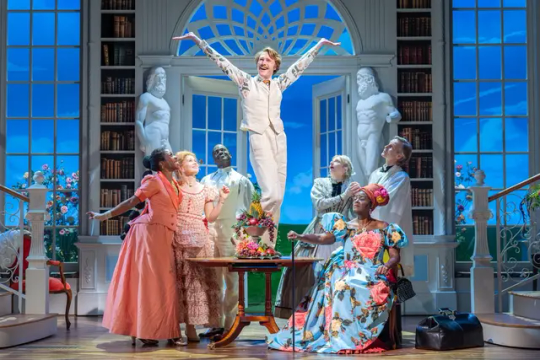



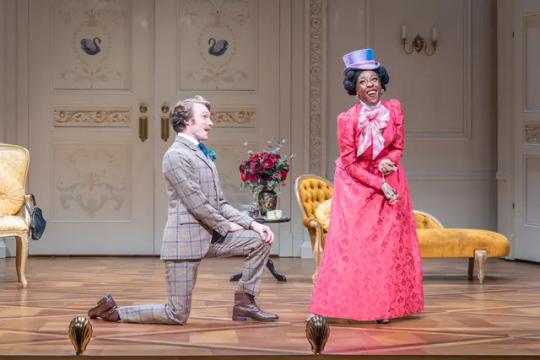
(X)
#Hugh Skinner#The Importance of Being Earnest#Get yourself a man that looks at you the way#Ncuti Gatwa#looks at Hugh in that play...#Especially in the picture where he's holding his pink trail for him...#The only actor that#Joey Batey#said was able to make his#Jaskier#laugh when he was auditioning as#Radovid#Hugh can really take you to emotional extremes can't he?#He'll go from pure silly lighthearted comedy to downright heartwrenching trauma#My Posts#Not my pictures nor review please follow link for source
30 notes
·
View notes
Text




at this point, combing through boards to post and going “oh i forgot i referenced that” is also a part of my boarding process
#which is quite funny since i was just thinking about this one. i mean i always am it’s my favorite Chuck Jones short. but i was thinking#about it in a ‘geez i really need to rewatch this’ way.. kept holding off since i wanted to wait until i could review it but life has been#busy. but i was skimming through The Million Dollar Cat and thinking ‘dang i guess My Favorite Duck is a take on the old ‘you cannot harm#this animal or person for this disclosed reason’ genre’ which is obvious but i never really thought to compare it to stuff like Million#Dollar Cat or The Wabbit Who Came to Supper#and now i wanna rewatch it to see how Mike Maltese worked his subversive magic keeping that in mind.#such as the signs turning against Daffy rather than#Porky just getting fed up and ignoring the signs anyway#which is usually how these things go#anyway good cartoon and i am so excited to post the boards for this.. i’m so behind on board posting though#pat
27 notes
·
View notes
Text
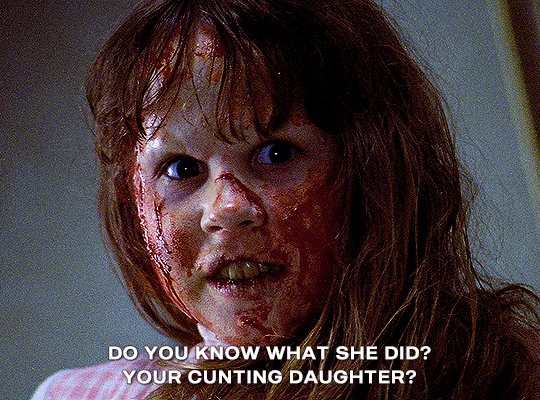
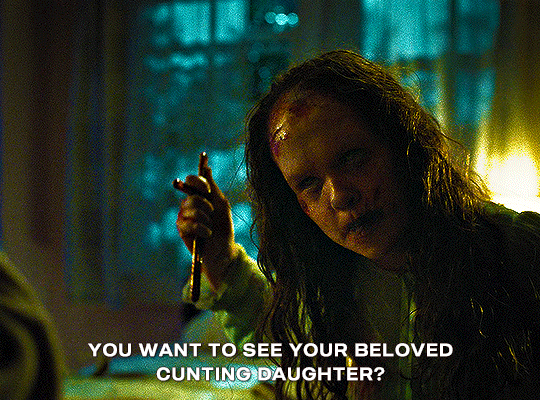
THE EXORCIST (1973) THE EXORCIST BELIEVER (2023)
#the exorcist 1973#the exorcist believer 2023#horroredit#fyeahmovies#horroredits#classichorrorblog#horrorgifs#junkfooddaily#dailyhorrorgifs#horrorsource#userbrittany#filmgifs#userscary#gifs*#usersavana#horror tw#blood tw#YOUR CUNTING DAUGHTAW#btw don't watch the exorcist believer it was bad and had anti-abortion propaganda lines I'll accept negative film reviews on this post only#the only way to not go insane over current events is to rot my brain with horror filmography sorry
245 notes
·
View notes
Text
Thoughts on Mastermind
(So yeah spoilers ahead)
So after letting my thoughts on the episode settle a bit and giving myself time to analyze, I have a LOT to say.
So first of all… yeah I think this is officially my new favorite Helluva episode.
I think this episode was pretty well paced (a little fast, but there was a LOT to cover) and also did a surprisingly good job at balancing the drama and humor. Also obviously ADORED the IMP found family showcased in this episode, they were entertaining in the first scene, and heart wrenching at the court.
Now for a bit more analysis, the way they handled the writing was REALLY interesting here. While first watching the episode, I was a little confused about Andrealphus’s plan, but after thinking about it… it’s scarily clever.
He knows that Stolas is smart in his own right, if he straight up brought him to court, he’d find a good way to argue. He knows how to work this type of stuff as shown in Oops. But if they brought in only Blitzø, they knew Stolas wouldn’t see until the broadcasted execution. He would have no time to form a concrete rational plan, Andre wants him to either act irrationally, or make himself look like a fool and incompetent. No one knows exactly what he’ll do, but Andre is giving Stolas as little time as possible to think it out. The hope is that he acts as irrationally as he has before.
And even if Stolas didn’t come, Andre purposely tries to make Stolas seem weak and somewhat helpless, incompetent. All the while he makes himself look an almost better version of our favorite bird. His backup plan is to make Stolas look incompetent and vulnerable, while it may be less immediate, with Stolas’s already somewhat declining reputation, this would make it easier for him to take Stolas’s title.
And despite being EXTREMELY irrational, Stolas did a pretty good job with his plan in my opinion. First of all, he brought ALL the theater kid energy in the song (which was an absolute banger by the way, I don’t care how cheesy the Stolitz part was I LOVE CHEESY) and did a great job playing the part. To me, this is proof that he had finally started to realize the classism. This is the type of part you can only play by understanding it even if you don’t necessarily believe it. He plays up the the classism and distaste for imps, he uses the fact that the other royals see them as useless and incompetent. And honestly, I think it was smart of him to be so vague in the song. Once again, he didn’t have a lot of time to think this through, and he somewhat used this to his advantage. Being vague added an air of mystery and made it seem like more of an unpredictable threat. He’s building up the fact that this mastermind has a dangerous plan, something possibly having to do with taking over the mortal realm. And then when he reveals himself to be the “mastermind”? Well of course he wouldn’t expose any of his “future plans”, Stolas is playing as someone who just wants the recognition and to be feared. Someone arrogant, feeling offended that an imp was getting the credit for his crimes. Claiming he has more planed while not naming those plans makes him a threat and will draw away almost any blame from Blitzø.
And of course this plan is impulsive, but he barely has any time to plan. He arrives right before the axe is about to come down on his lover’s neck. His only goal right now is making sure Blitzø stays alive. In the song he even acknowledges how impulsive it is to throw everything away for this idiot he is still frankly mad at. But he’s learned he can choose his fate, and that’s exactly what he’s doing.
And of course I ADORED the Stolitz in this episode, they were both so perfectly dramatic and the absolute SOFTNESS in the last scene had me making absolute demonic and feral noises. But, despite this somewhat being a closure to the season 2 Stolitz drama (however we do still have Sinsmas) I’m happy they’re still leaving room for more angst even with them now being able to properly blossom. This episode did an EXCELLENT job at showcasing the classism via the unfairness of the court case, so it feels fitting that at the end the power dynamic almost switches. Blitzø is now a celebrity amongst imps and lower class demons, while Stolas essentially lost everything, including his daughter. And while I definitely think this is setting up for angst in at least the next episode (in which I very much think they’re going to go and try to save Octavia from her bitchy mother), this power dynamic is going to feel different, because while there is still somewhat a power dynamic now, there is also a much larger level of understanding between the two of them. They now feel more capable of facing this together, there is less doubt of feelings. I’m REALLY excited to see how they handle this, and yes I also am an absolute sucker for hurt/comfort.
Those are most of my major thoughts in this episode. I loved every single part of this beautifully dramatic episode (yeah I expectantly loved Vassago) but most of the other things I would bring up have already been said. Plus this post is too long so yeah that’s it for now.
#Can’t wait to see what the antis have to nitpick about this one#Also didn’t mention it but the animation was PEAK#Oh boy now my two hyperfixations are going to be Helluva and Kirby aren’t they?#Lord what a mix#This episode would’ve failed if it wasn’t as overdramatic as it was#Sometimes cheesy and over the top is the best way to do something and I love that Helluva isn’t afraid of that#Don’t be afraid to sound like a soap opera#helluva boss#helluva boss spoilers#helluva boss mastermind#hellaverse#stolitz#helluva boss review#Btw this took me like 2 hours to write#I’m bad at organizing my thoughts properly when I have so much to say#Hala yaps
20 notes
·
View notes
Text
To those of you wondering (aka no one), I finished both The Vampire Armand and Merrick and I have a lot of thoughts and feels. I'm skipping Blood and Gold for now to go directly to Blackwood Farm (I'll read B&G later), but first I'm going to read something else, just to take a break.
TVA thoughts: man, Armand is messed up. And extremely compelling. But so messed up. As always, the theme of faith crisis, which seriously reaches new heights with these bitchy vampires, is not something I can fully immerse myself in, but it was fascinating to see his numerous metamorphosis. I liked how he bridges Western and Eastern Christianisme, especially through art. Now I'm thinking that if Rolin Jones makes him originally Muslim in the show, that could expand even more the conversation on how faith, and especially Abrahamic faith, has been in conversation for thousands of years and could be such a rich, diverse and spiritual, intellectual and artistic theme. I can already imagine some fascinating discussions comparing (not in a superior way but in a complementary way) coming from Muslim faith to Roman Catholic faith, the way book!Armand talks about the richness of his life in Kiev Rus despite the poverty and ascetism, and the richness of his life in Venecia despite the luxury and abundance.
As for Benamin and Sybille... I don't have much thoughts about them. Sybille is one of those female characters AR seemingly favors, not so much human as a nymph or a dryad, "perfectly splendid". And Benji is a caricature of an Arab child. Nuance? 401 not found.
Merrick thoughts: David for the love if everything, shut. The. Fuck. Up. Holy moly. I like David, I do, but damn the entire recollection of his history with Merrick was looooooong. I'm here to see Louis haunted by Claudia and haunting Lestat's coma, not how hard you're pining for the kid you practically raised! Also. ALSO. You're just going to leave that whole thing with the Olmec or possibly another more ancient Mesoamerican civilisation without ever giving us more? That was the most interesting part of it all! The vodoo history, the connection between Louisiana and Caribbean vodoo and old Native South-American religions! More about this, less about Merrick's perfect breasts, I am begging you. (It is at this point that the reader of this post realises OP is 100% definitely ace and more interested in books and witchcraft than breasts and whether a 70yo man can still get it up - also, hey, Anne Rice's vampires are practically asexual and their lust and pleasure is mostly derivated from blood, with some notable exceptions like Armand and Marius, and a love relationship between two vampires is then based on romantic love and blood sharing, so can I hear a hell yeah for some ace representation or are we still conflating eroticism with sex)
Another thing I kept thinking about throughout the book is how Louis is perceived by his fellow vampires. Since basically the second book, since we've lost his own POV, everybody who's ever said anything about him (so Lestat, Armand and David) have insisted on two points: how very weak and meek Louis is, and also how irresistible, beautiful and charming. Granted, I've known Louis first through his portrayal on the show (hi Jacob you're so fiiiiiiine), and then through his own narration in the first book, but I've never had the impression that he was weak. Beautiful and seductive, yes. Weak? I see a human man going through tragedies and still enduring, going through vampiric transformation and then suffering for decades the loss of his humanity, struggling with reconciliating both sides of himself, but mostly I see a vampire who rebuilt himself after losing everything without sacrificing his sense of self. I see Louis as very strong actually (up to the point where resilience breaks, because resilience cannot be sustained on a long term, but that's another debate). He knows who he is, and don't you know how hard that is? He doesn't cling to faith or pride. He knows he's doomed, he knows he's monstrous, he knows there's nothing he can do to change that, and instead of railing against his fate, he goes on about his undead life. He gets his books and he reads them, he surrounds himself with literature and what little comforts he thinks in his shattered self-esteem he deserves (his ragged sweaters and soft trousers); let's not lie to ourselves tho, Louis doesn't like himself, or more exactly he doesn't care about his corporeal body - what matters to him is his mind, and once again, this author is extremely ace and also very aro and very nonbinary, so Louis to me is very much ace and agender coded, though really not aro, because his love for Lestat (and sometimes his fondness, shall we say, for Armand) is the only thing that can rouse him up from his literary slumber.
...
Oh, man, I have a lot to say about Louis, for how little he appears in the books so far. Still have BF, BC and the PL trilogy to devour. So I guess you can say, for as much as Lestat is occupying my entire brain, very much like him, my favorite is Louis? Yeah, that tracks. Melancholy, quiet, dark-haired green-eyed monster with more humanity than humans, preferring his solitude and the company of books to anyone else, hopelessly and helplessly devoted to one person, expert in brooding and grieving, literature specialist, not very attached to his physical self. Yeah. I'm not surprised.
#rapha talks#rapha reads#anne rice#the vampire chronicles#the vampire armand#merrick#vc books#armand de romanus#david talbot#louis de pointe du lac#lestat de lioncourt#books#literature#book review#wow that got long#wasn't expecting to write that much i just wanted to write a couple of lines about each book so i could move on to the next#but apparently i have a lot to say about louis in particular#i mean - vampires have been making me extremely verbose since i was 12#so no wonder *the* vampire books of the last half-century are making me go insane#anyway - i'm going to read a couple of fanfics i've noticed maybe finish watching the bear s3 clear my mind a bit#and then i'll dive right back in with blackwood farm#by the way i totally encourage fic recs and also discussions of my thoughts (how flawed and incomplete my perceptions of these characters?)#(obviously over 40 years of existence and adoration of these books so much has been said and written and i would love to discuss it with#people who have read and studied and loved these books in much more depth than i)
30 notes
·
View notes
Text
(╥﹏╥)
#We've had our yearly secret santa gifts exchange at my dorm and I've been gifted the first volume of Beast 😭😭😭😭😭#I'm crying forever. This december marks three years since I've watched the first b/sd episode#and yet this is the first time I actually own a b/sd manga volume. Like I own it and I can read it whenever I want!!! How cool is that!!!!!#Like there's so many Akutagawa images in it!!!! It's insane!!!!!!!! AND IT'S BEAST AT THAT#I'm deeply moved because I never spoke about it to virtually anyone here (at my dorm)?#Like I suppose a bunch of people vaguely know I like anime but only a couple of close friends know I like. Like-like reading manga lol.#And the person who gifted it DEFINITELY didn't know I like anime in general much less b/sd specifically much less Beast in particular!!!!!#I'm 100% sure (they just arrived this year and we hadn't even had that much occasions to talk to each other).#Which means they went through the trouble of gathering intel from my close friends about what I like and actually follow through‚#seek for the specific manga in a comic store etc... It's such a nice gesture I'm so heartwarmed.#And of course I'm glad for every gift I've received in the last years (genuinely)‚ but the fact that this was the most *specific* to what–#I like. It makes it so special! They were so kind.#There must be one (1) person in this whole 60 people dorm who knows I like Beast–#(that would be the girl who introduced b/sd to me in the first place) and the fact that they asked them for it...#I feel both very grateful and lucky lol#When I unwrapped it!!! Like I thought it was just a random book which would have been nice but like!!!!!#When I actually saw through the thin paper the cover!!!! The scream I screamed in my head#Anyways!!!! I own a b/sd manga now!!!!! I've only got time to go through the first chapter so far but it's suchhhh an experience.#It's like reading it for the first time again 😭😭😭 Half because the translation is so much different than the English one lol.#And I basically know the English version by heart. Half because I never saw this kind of high quality!!!!! It's!!!!! Insane!!!!! Like!!!!!!#I'm crying 😭😭😭 The drawings are so sharp and crisp (in the good way). The lines are so clean there's no disturbance at all#I literally never saw anything so good in my life I'm crying a little. I'm so so glad they blessed me with Beast specifically#The takebon edition is pretty cheap (it's just planet manga so there's no color illustrations or dust cover or anything unfortunatelly.#But to make up for it the volumes are significantly cheaper then let's say J-Pop)#There's also some unique typesetting choices? The text from the book-like boxes is in lowercase which is interesting!#Initially I thought I wouldn't have liked the translation (opening it randomly there was Akutagawa saying “crepa!” (“die!”) to Dazai in ch1#Which was kinda jarring since it's very low register and everyone knows Akutagawa has very complex speech patterns.)#But actually reading it I'm really enjoying the translation so far!!!!#There's so many choices that made me grasp details I actually missed all the times I've read the English translation.#That is to say! Very excited to read it!!!! Will probably make a review / translation commentary if I can find the time!!!!!
14 notes
·
View notes
Text

Something about this quote. Something about how trust is a major factor to Gideon's and Harrow's relationship to work together and how that snowballs into more. It's just going to rotate in my mind forever.
#I made this meme a long time ago but it's always relevant#Any Locked Tomb quote is relevant#I keep thinking about the negative review#saying how the development between Gideon and Harrow comes from nowhere#but I disagree#It's more of a blink and you miss it#There is so much going on even in slight interactions#I wish I had the braincells to be coherent about the process of trust in GtN#it's between harrow listening to Gideon when she says she needs sleep and food#It's Harrow attempting the dinner party with Gideon#It's Gideon demanding that they need to work together and Harrow coming to terms with this#It's Gideon's mass amount of reasonable distrust against Harrow on why she had a spare head in her closet that sends her to Pal#Only for Camilla to handcuff Harrow and make the two come together to communicate the situation#The pool scene was just the layout of why they weren't open with certain situations at Canaan house leading to more explanation of#well you know#bread in drawer is definitely a way to earn my trust#and communication#I guess#griddlehark#tlt quotes#gideon the ninth#tlt brainrot#tlt#the locked tomb
106 notes
·
View notes
Text
@ most recent anon I'll be honest I don't know how to answer that one publicly but you're good + no need to apologize + glad I could help you I think. legitimately it's fine though
#lab notes#just want to clarify it's fine when people let me know on a more casual level like 'hey I used to see things this way but your review#changed my mind!' because that's just feedback#but I honestly never want like. big apologies or self flagellation... it's ok man I am not the arbiter of morals. I'm just a guy#and you're not evil or anything. it's cool. go eat a snack take a little break
21 notes
·
View notes